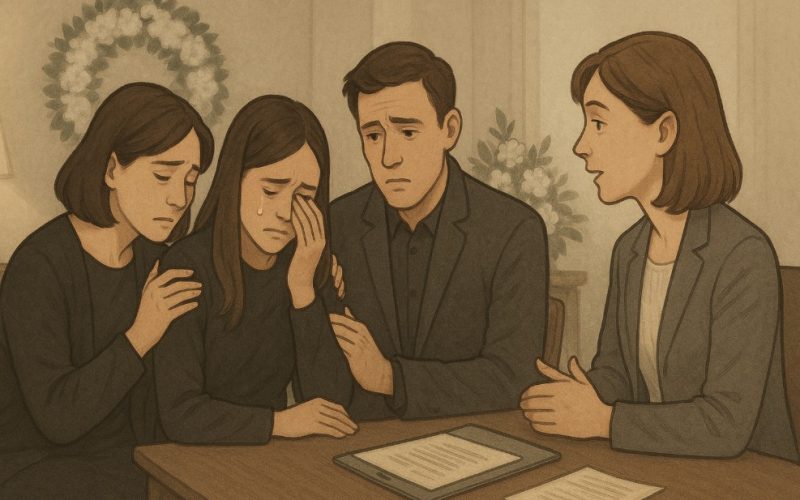Dealing with the loss of a loved one is never easy, and the financial strain of organising a funeral can make it even more overwhelming. For families in the UK facing financial hardship, the Department for Work and Pensions (DWP) offers a Funeral Expenses Payment.
This guide explains how much the DWP funeral grant provides, who is eligible, and how to apply step-by-step to ease the burden during a difficult time.
What Is a Funeral Grant?
Losing a loved one is emotionally challenging, and the financial burden of arranging a funeral only adds to the difficulty. In the United Kingdom, the Department for Work and Pensions (DWP) offers some relief through what’s known as the Funeral Expenses Payment, often referred to as the Funeral Grant.
This payment is designed to support individuals who are on certain benefits and are responsible for arranging a funeral. It doesn’t cover the entire cost but offers significant assistance for basic services, easing some of the financial strain during such a sensitive time.
The Funeral Expenses Payment can be claimed by someone who has taken on the responsibility of organising the funeral. This could be a close family member, partner, or even a friend, provided no one else is more closely related or willing to take on the role.
The grant is paid either directly to the funeral director or reimbursed to the applicant if the costs have already been settled. The grant is not automatically awarded. Applicants need to meet strict eligibility criteria and complete a detailed application process.
Despite its limitations, this grant can be a vital source of support for individuals and families who might otherwise struggle to manage funeral costs.
Who Is Eligible for a Funeral Expenses Payment in the UK?

Eligibility for a DWP Funeral Grant hinges on specific criteria. Not everyone arranging a funeral can claim it, and the conditions are designed to ensure that the support reaches those who are financially vulnerable.
The payment is closely tied to the applicant’s benefit status and relationship to the deceased.
Relationship Requirements
To qualify, the applicant must have a particular relationship with the deceased. This usually includes:
- A spouse, civil partner, or partner (including same-sex partners living together)
- A close relative or close friend (if there are no closer relatives)
In cases where there is no immediate family available or willing to act, other individuals may be considered, but this often requires additional documentation and justification.
Benefit-Based Criteria
The applicant must also be receiving one or more of the following benefits at the time of application:
- Universal Credit
- Income Support
- Income-based Jobseeker’s Allowance
- Income-related Employment and Support Allowance
- Pension Credit
- Housing Benefit
- Child Tax Credit
- Working Tax Credit (with a disability or severe disability element)
The government assesses the benefit status carefully to ensure the applicant genuinely needs support. If benefits are jointly claimed with a partner, both their incomes and benefits are considered.
Residency Status
Applicants must be living in England, Wales, or Scotland. In Northern Ireland, a similar scheme is run under the NI Direct system. Additional rules may apply for those who live abroad but are responsible for a funeral in the UK.
Special Cases
Funerals involving stillborn children (after 24 weeks of pregnancy) or children under 16 may also be covered by the grant. In these cases, support may differ slightly, and additional entitlements could be available through the NHS or local authority provisions.
How Much Is a Funeral Grant From DWP?
The Funeral Expenses Payment is intended to support essential costs. The total amount depends on several factors, including the applicant’s circumstances and the arrangements made.
It is important to understand that the payment does not usually cover the entire cost of a funeral.
Basic Amounts and Maximum Payment
In most cases, the DWP funeral grant offers a maximum contribution of:
- Up to £1,000 towards other funeral expenses
- Full coverage of certain necessary costs, such as cremation or burial fees
The total amount can range from several hundred pounds to just over £1,000, depending on the claim and what items are included.
Covered Costs
Here is what the payment may cover:
- Burial fees for a particular plot
- Cremation fees, including doctor’s certificates
- Travel costs for arranging or attending the funeral
- Expenses for moving the body within the UK if it is over 50 miles
- Up to £1,000 for other costs such as funeral director fees, coffin, or flowers
Costs Not Covered
Some costs are not covered or only partially reimbursed:
- Obituary notices
- Food and drink for the wake
- Expensive coffins or optional services
- Headstones or memorials
Example of Covered Expenses
| Funeral Cost Item | Covered by DWP | Notes |
| Cremation or burial fees | Yes | Full necessary fees only |
| Doctor’s certificate | Yes | One or two copies |
| Funeral director fees | Partial | Basic services covered |
| Coffin and transport | Partial | Standard options only |
| Flowers and catering | No | Must be self-funded |
| Obituary notice | No | Not considered essential |
Understanding these limitations helps in planning a funeral that is respectful yet financially manageable. Claimants are encouraged to work closely with funeral directors who are familiar with the DWP grant system.
Can You Apply for a DWP Funeral Grant If You’re Not a Family Member?

While close relatives and partners are usually the ones to claim the funeral grant, there are situations where someone outside the immediate family can apply.
This typically applies when there are no other surviving relatives or the existing family members are not willing or able to take on the responsibility.
In such cases, a close friend or a member of the community who takes on funeral arrangements may be considered. However, proving that no closer relative is available can be challenging.
The DWP may require a signed statement or evidence that other relatives have declined to make arrangements.
The key consideration is whether the applicant is the person who has accepted responsibility for the funeral expenses.
If someone steps in due to absence of others and meets all other eligibility criteria, they can apply, though the process may involve additional steps and scrutiny.
How Should Someone Apply for the Funeral Grant?
Timing is critical when applying for the Funeral Expenses Payment. The application must be made within six months of the date of the funeral. Missing this window could mean losing eligibility, regardless of circumstances.
How to Apply?
There are three main ways to apply:
Online
The most efficient method for many is the GOV.UK website, where applications can be completed using an online form. You’ll need to provide benefit information, details about the deceased, and estimates or invoices for funeral costs.
By Phone
Applicants can also call the Bereavement Service helpline to apply over the phone. This option is helpful if there are questions about the process or if internet access is limited.
By Post
Paper applications are available upon request and must be submitted with photocopies of supporting documents.
What Information Do You Need to Apply for the DWP Funeral Payment?

To successfully submit a claim, applicants need to gather a range of information and documents. Having these prepared in advance helps to avoid delays.
Required Information
- Full name and National Insurance number of both the applicant and the deceased
- The date and place of death
- Relationship to the deceased
- Details of the funeral, including date and location
- Estimate or invoice from the funeral director
Proof of Benefits
Applicants will need recent award letters or documents proving receipt of eligible benefits. In cases of joint benefit claims, details of both parties are reviewed.
Payment Instructions
If the funeral has not yet been paid for, the DWP will usually send the money directly to the funeral director. If it has already been paid, the applicant may receive the funds as reimbursement.
What Happens If the Funeral Is Already Paid For?
One of the most commonly misunderstood parts of the funeral grant system is what happens when funeral costs are already covered before an application is submitted.
Many applicants mistakenly believe they cannot receive assistance after payment has been made.
Reimbursement is Possible
In reality, the DWP does allow for reimbursement as long as the payment was made by the person claiming and they meet the eligibility requirements. This includes payments made using credit or loans.
Time Limit Still Applies
The six-month limit from the date of the funeral still applies, even if you are claiming retrospectively. Waiting too long to apply can result in the claim being rejected.
Non-Claimable Situations
If someone else paid for the funeral, such as another family member or a charity, the applicant may not be reimbursed. The DWP prioritises the individual who made the arrangements and bore the financial responsibility.
Difference Between the Funeral Grant and the Bereavement Support Payment

Though often confused, the Funeral Expenses Payment and Bereavement Support Payment are separate forms of financial help. Understanding the difference can help families apply for the right support.
Funeral Expenses Payment
This is a one-time grant designed to help cover the cost of arranging a funeral. It’s based on financial need and requires the applicant to be receiving certain benefits.
Bereavement Support Payment
This payment is for spouses or civil partners of someone who has died. It provides income support for up to 18 months following the death.
Key Differences
| Feature | Funeral Grant | Bereavement Support Payment |
| Eligibility Based on | Benefits and relationship | Marital status |
| Maximum Amount | Around £1,000 + expenses | Up to £3,500 (lump sum) |
| Purpose | Help with funeral costs | Replace income after death |
| Can Be Claimed Together? | Yes | Yes |
What Happens After the Application Is Submitted?
Once the funeral grant application has been submitted, it goes through a verification and assessment process. The timeline and communication from the DWP can vary depending on complexity and documentation.
Average Processing Time
Most applications are processed within 15 to 25 working days. However, this can be delayed if documents are missing or if there are questions about benefit eligibility.
How Payment Is Made?
If the funeral has not been paid for yet, the money is typically sent directly to the funeral director. If it has already been paid, the funds are transferred to the claimant’s account.
Rejected Applications
If the application is denied, the DWP will provide reasons. Applicants can request a reconsideration or appeal the decision if they believe it was made in error.
Are There Other Ways to Get Help with Funeral Costs?

Besides the DWP funeral grant, several other sources of financial help exist in the UK, especially for those who don’t qualify for the government’s scheme.
Local Authorities
Some local councils offer discretionary funeral payments for individuals in extreme hardship. These vary by region and may require proof of need.
Charitable Support
Organisations like Marie Curie, Turn2Us, and the British Red Cross offer grants or financial advice for those dealing with bereavement.
Funeral Plans and Insurance
Those with pre-paid funeral plans or funeral insurance may not need to apply for the DWP grant. However, it’s important to check what is covered as some plans are limited.
Final Thoughts
Navigating the emotional and financial aftermath of a death is one of life’s greatest challenges. The DWP Funeral Expenses Payment provides crucial support to those already under financial strain, ensuring that every person can be laid to rest with dignity.
Though the payment may not cover all costs, it offers an important foundation, especially when combined with careful budgeting and support from other organisations.
Understanding the application process, eligibility requirements, and timeline helps prevent additional stress during a deeply personal time.
Families are encouraged to plan early, communicate openly with funeral directors, and gather documentation quickly.
With the right information and preparation, this government support can significantly reduce the financial burden and allow individuals to focus on what matters most, honouring the memory of their loved one.
Frequently Asked Questions
What benefits make someone eligible for a DWP Funeral Grant?
People receiving benefits such as Universal Credit, Income Support, Pension Credit, Housing Benefit, or Child Tax Credit may qualify for a DWP funeral grant if they meet other eligibility criteria.
Can funeral grants be backdated or retroactively applied?
Yes, you can apply up to six months after the funeral. Claims submitted within this time can be reimbursed even if the funeral has already been paid for.
Does the DWP funeral payment cover the cost of a headstone?
No, the grant does not include costs for memorials or headstones, as these are considered non-essential expenses.
What if multiple family members apply for the grant?
Only one person can be considered responsible for the funeral. The DWP usually recognises the person who has made the arrangements or signed the funeral director’s contract.
Is the funeral grant taxable or does it affect other benefits?
No, the grant is not taxable and does not count as income. It won’t affect the claimant’s other benefits.
How long does it take to receive a DWP funeral grant decision?
Most claims are processed within 15 to 25 working days, provided all required information is submitted correctly.
Are there any regional differences in how funeral grants are processed in the UK?
Yes, Northern Ireland operates a slightly different scheme. England, Scotland, and Wales follow the standard DWP application system, while NI uses the Social Fund administered by NI Direct.









